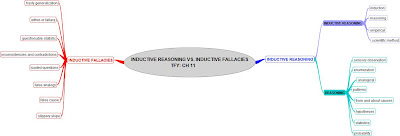
TFY: CH 11 INDUCTIVE REASONING AND INDUCTIVE FALLICIES
Inductive reasoning is a reason to a conclusion about all members of a class on the basis of an examination of a few members of a class. Induction reasons from the particular to the general. Method for researching from personal observation is call empirical or scientific method. The different types of inductive reasoning are:
· Sensory observation: awareness through basic senses of sight, taste, touch, smell, and hearing.
· Enumeration: range of simple counting to gathering statistics.
· Analogical reasoning: a form of comparison, similarities between things that seem different.
· Discovering patterns: look for patterns, note their characteristics, and draw conclusions.
· From and about causes: probable causes of events
· Hypotheses: preliminary conclusion derived from inductive reasoning.
· Statistics: mathematics of the collection, organization, and interpretation of numerical data.
· Probability: the ratio of the number of actual occurrences of a specific event to the total number of possible occurrences.
Inductive fallacies are inductive reasoning gone wrong. Some inductive fallacies are:
· Hasty generalizations: fallacy of over generalizing, drawing a conclusion without enough sampling.
· Either-or fallacy or false dilemma: only two choices when there are actually other options.
· Questionable statistic: fallacy of offering statistics that are unknowable, faulty or misleading
· Contradicting and inconsistencies: making claims or offering evidence that contradict the conclusion.
· Loaded questions: using a biased question in order to obtain a determined result
· False analogy: basing an argument on a comparison of two things that has some similarities, but also have a lot of difference that are ignored.
· False cause: a claiming a connection between events without supporting evidence.
· Slippery slope: arguing without sufficient proof
No comments:
Post a Comment